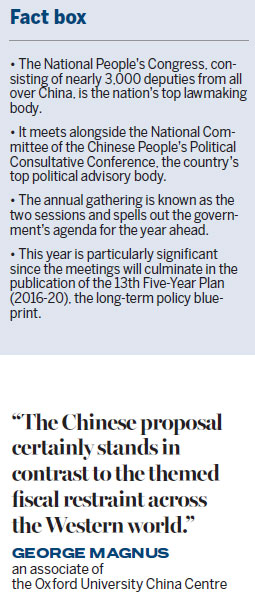Growth focus

Premier Li's assertion dispels negativity about Chinese economy and charts clear direction
The Chinese premier's insistence that China was not giving up on growth swept away much of this year's negative sentiment about the world's second-largest economy.
Li Keqiang made clear in his keynote speech delivering the Government Work Report to the National People's Congress in Beijing on March 5 that the country had no alternative but to "forge ahead".

"The next five years is an important period to overcome the middle-income trap and there will be many challenges and risks," he said.
"We have to focus on economic development without any hesitation and push ahead with development in a scientific way and deal with the challenges properly."
The premier set a target for 2016 growth of between 6.5 percent and 7 percent, using a band rather than a precise point for the first time in more than 20 years as the goal.
He also indicated that fiscal policy would be an important instrument to drive growth with the central budget deficit target being raised from 2.3 percent to 3 percent - the highest since the formation of the People's Republic of China in 1949 and deficits first being allowed in 1979.
The premier also placed major emphasis on supply-side structural reforms and, in particular, the biggest shake-up of China's state-owned enterprises since that of former premier Zhu Rongji in the 1990s.
He said he would set aside a fund of $15.2 billion (13.8 billion euros) to help the 1.8 million people expected to lose their jobs over the next five years as the government deals with the so-called zombie enterprises that remain a drag on the overall economy. 
Commodities markets, in particular, responded well to Li's speech, which could provide a boost to many African countries as well as Russia and Saudi Arabia.
On March 7, the price of iron ore, a key ingredient of steel, was bolstered by Li's promise to support the China housing market, and rose by 17 percent, its biggest ever one-day rise.
On the same day, oil prices gained 5.6 percent and rose above the psychological $40 a barrel mark at $41.04 a barrel, the highest level since the end of last year.
Louis Kuijs, head of Asia Economics at Oxford Economics, says the market reaction showed how much focus there was now on China's growth.
"Within China the equity prices of property companies have also gone up very sharply, so clearly the market is witnessing and is pricing in that strong commitment to growth by the government," he says.
"I don't really doubt that we will see robust infrastructure spending and we will also see other aspects of China's policymaking adding to growth."

Paul Kavanagh, Ireland's ambassador to China, says the premier's speech went a long way to reversing bearish expectations about the Chinese economy when the Shanghai Composite Index of shares plummeted in January.
"I think some of the international coverage is a little bit negative on the Chinese economy," he says.
"I agree with the premier that it has challenges, but it also has fundamental strength."
Pascal Gasunzu, Burundi's ambassador to China, believes the policy outline in the speech also could be good for Africa.
"I can see many opportunities in Premier's Li's report, as more Chinese investment is expected to come to Africa."
Some believe the emphasis on fiscal policy with the government set to run a 2.18 trillion yuan (305 billion euros, $335 billion) deficit might open up the debate as to whether deficit financing could be the solution to global slowing growth. The Organization for Economic Cooperation and Development forecasts world growth to fall from 3.3 to 3 percent this year.
The recent G20 meeting of central bankers and finance ministers in Shanghai avoided this emphasis, advocating a mix of fiscal and monetary stimulus as well as restructuring.
There will now be much anticipation ahead of the summit under China's presidency, which takes place in Hangzhou in September.
"I think it is possible it could lead to renewed focus on fiscal policy globally. The problem though is that space to do this is more limited ... than in China," adds Kuijs at Oxford Economics.
"In many European countries the fiscal arithmetic is not very pleasant, with high debt and slow growth, so there is not a lot of space to do it. Germany, one country that perhaps could use fiscal stimulus, has no appetite for it and says it is not going to do it."
George Magnus, an associate of the Oxford University China Centre, says China will probably be an outlier on fiscal policy for the time being.
"The Chinese proposal certainly stands in contrast to the themed fiscal restraint across the Western world," he says.
andrewmoody@chinadaily.com.cn
(China Daily European Weekly 03/11/2016 page1)
Today's Top News
- Takaichi must stop rubbing salt in wounds, retract Taiwan remarks
- Millions vie for civil service jobs
- Chinese landmark trade corridor handles over 5m TEUs
- China holds first national civil service exam since raising eligibility age cap
- Xi's article on CPC self-reform to be published
- Xi stresses improving long-term mechanisms for cyberspace governance






























